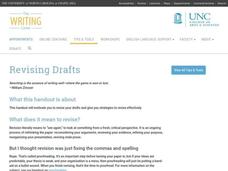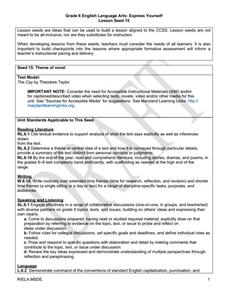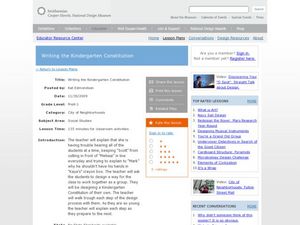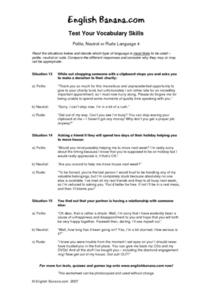North Clackamas School District
Context Clues: Synonyms
What do you do when you find a word that's not familiar to you? Help readers use context clues when encountering unfamiliar words with a grammar activity. They note the parts of the sentences that show the meaning of the word, write how...
CC Homestead
Summarize
Designed for third graders but appropriate for older learners as well, this packet of materials underscores the necessity of teaching kids how to summarize, how to identify main ideas and supporting details, and how to ask questions...
Museum of Disability
Looking Out for Sarah
Perry the dog is Sarah's best friend and her guide to the visual world. Young readers learn about guide dogs and communication with Looking Out for Sarah by Glenna Lang, through a series of discussion questions and activities.
University of North Carolina
Revising Drafts
Don't simply proofread ... revise instead! Revising drafts is the topic of the 17th handout in UNC's Writing the Paper series of 24 lessons. Writers discover the importance of revision, as well as steps to follow during the process.
Curated OER
A Mysterious Story Poem
Your scholars will be hooked after reading the cryptic narrative poem "The Listeners." They explain why it is so mysterious, then use the poem to learn about pronouns. Learners read an excerpt from the poem that has been altered to not...
Virginia Department of Education
The Writing Process for Persuasive Writing
Get your junior high writers stimulated with the strategies and ideas available in this activity. Learners discuss and debate controversial subjects, and outline their reasons with an online graphic organizer (link included) that creates...
Curated OER
Express Yourself Lesson Seed 15: Theme
Build understanding of theme with an activity designed for The Cay and the Common Core. Small groups or pairs use graphic organizers to determine themes, find and record related details from the text, and formulate theme statements. In...
Curated OER
How the New Year is Celebrated around the World
Develop compare and contrast skills while expanding cultural knowledge by looking at how different countries ring in the new year.
Curated OER
Report Writing
Why don't dinosaurs wander the earth any longer? Answer this fascinating question with young readers as they examine a brief informational text. There are bolded words to separate text sections which are an excellent example of...
Eastland FFA
Grapes of Wrath Movie Questions
John Ford's 1940 film version of John Steinbeck's The Grapes of Wrath is the subject of a 23-question worksheet designed to accompany a viewing of the film. The questions not only focus viewers on events, but also ask them to make...
Reading Worksheets
Inferences Worksheet 1
Knowing how to make inferences is a very important skill for readers of all ages. Help your pupils master this ability by providing practice. Pupils read four short passages and answer two to three questions about each to practice making...
DePaul University
Seasons on the Prairie
Fact and opinion passages inform readers about the seasons on the prairie and Zambia in Southern Africa. Then, test scholar's knowledge with multiple choice and short answer questions.
Curated OER
Only the Facts
Practice the strategy of summarizing to gain meaning and knowledge from an informational text. Young readers highlight supporting details and main ideas, and then they use this to summarize two articles: "The Great Quake" and "What is an...
Cloud Front
Socratic Seminar for: A Christmas Carol
Socratic seminars are a great way to encourage the development of critical thinking, speaking, and listening skills. And Charles Dickens' A Christmas Carol is a perfect text for such a seminar. Use the questions in the packet to...
Curated OER
Story Openings
What a terrific exploration of writing! This resource focuses on how to write a great beginning for a narrative piece. It is a thoughtful and helpful look at this topic.
Curated OER
Please, Take A Message
High schoolers identiry which information is important to capture when dictating a telephone message. In pairs, students practice dictating and recording telephone messages using a dedicated telephone message pad. This activity is...
Curated OER
Author Study: Laura Ingalls Wilder
Students read novel, Little House in the Big Woods, explore web sites and other resources devoted to author, Laura Ingalls Wilder, complete Venn Diagram showing ways they and author are alike and different, and create diorama, read...
Curated OER
Kindergarten Constitution
Learners create their own classroom constitution. In this leadership skills lesson, students work together to solve problems. Learners discuss why rules are important and brainstorm ways to solve classroom problems. Students vote on the...
Curated OER
Comparing Apples and Oranges
Students understand that many organizations in the community have needs. In this philanthropy lesson, students research pros and cons of a philanthropic organization. Students create a multimedia presentation to show why their...
PBS
Stories of Painkiller Addiction: Myth or Fact
Are opioids the most abused drug after marijuana? How hard is it for young people to obtain painkillers without a prescription? Middle and high schoolers explore the growing epidemic of opioid addiction with a lesson that prompts them to...
Curated OER
The Sky is the Limit!
Go above and beyond the basic requirements to get your ESL learners excited about English.
Curated OER
Read to Learn
Students explore the concept of community helpers. In this community helper lesson, students brainstorm the community helpers in their neighborhood after reading a book about jobs in the community. Students then host a community helper...
Curated OER
Polite, Neutral Or Rude Language 4
In this language arts worksheet, 5th graders learn the difference between polite, neutral and rude responses to oral requests. Students read 3 situations and 3 possible responses. Students compare them and decide which is the most...
Curated OER
Test Your Vocabulary Skills Polite, Neutral or Rude Language 4
In this vocabulary skills activity, students read 3 scenarios before deciding whether the language that would be used in the situation would be polite, neutral, or rude.

























